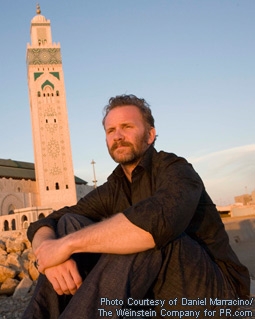
Morgan Spurlock has carved out his own genre of filmmaking, by not merely documenting the hot button topics that concern all of us, but in actually placing himself, in both mind and body, on the front lines. Spurlock is the guy who subjected himself to famous month long experiments: a diet consisting solely of McDonald’s fast food in his 2004 feature documentary debut Super Size Me; subsisting on a minimum wage income with then fiancée Alexandra Jamieson; and doing time as an inmate in a Virginia county jail. In recalling these experiences, Spurlock muses at his fulfillment in what he considers to be the privilege of stepping into another man’s shoes for a spell, and living an existence that is a clear departure to his own life’s path.
His research is strictly first person, and he feels it keeps him honest and eliminates the possibilities of any hypocrisy or distance between himself and the subject matter he chooses to explore. Though Morgan Spurlock plays down the emotional and spiritual fortitude it requires to be so far out of one’s comfort zone, he does believe he has found his artistic voice in these first hand experiential documentaries.
Morgan Spurlock’s latest project is his second documentary feature film entitled, Where in the World is Osama Bin Laden?. His sophomore feature length effort, once again, places Spurlock in some very compromising circumstances. After visiting his physician for an extensive round of vaccinations and preparing for everything from hand grenades to gunfire to the very real possibility of American kidnappings, Spurlock says goodbye to his pregnant wife and heads for the heart of the Middle East on a quest to find Osama Bin Laden. Spurlock’s rationale as he puts it in his film, “If I’ve learned anything from big budget action movies, it’s that complicated global problems are best solved by one lonely guy.”
PR.com (Allison Kugel): When you were a student at NYU, what were your aspirations or ideas of the kind of films that you thought you’d be making? And is it in line with what you’re doing right now?
Morgan Spurlock: I think when I was at film school, like most of the people I was in film school with, I wasn’t really looking to be a doc[umentary] filmmaker. That happened just by happenchance when we made Super Size Me (Spurlock’s 2005 Oscar nominated documentary that takes aim at the fast food industry), that I just fell in love with something that I didn’t know was going to affect me the way it did. When I was in school I wanted to make narrative films. I wrote screenplays and short stories and short plays. Before I ended up making this film, I was writing a lot of plays in New York City. I had a play that went up and won an audience award in Fringe Festival in 1998, and I had a few different one-act [plays] that were put up around the city in little one-act festivals. That was kind of the path I was heading in before I made Super Size Me.
PR.com: How did you come up with the idea for Super Size Me and how did you start in this trend of using yourself as the guinea pig in your films?
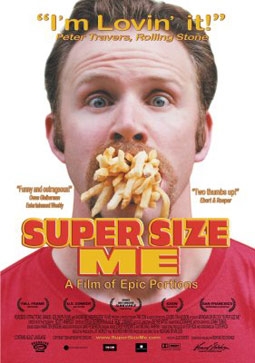
Morgan Spurlock: We had a show that was on MTV called I Bet You Will that got cancelled, and we had about fifty grand saved up in the bank and so I basically said, “Let’s take this fifty thousand dollars and make a movie.” I had just finished an adaptation of a play I had written called The Phoenix Two, a screenplay. I started watching a lot of plays that had been made into movies, and they all kind of felt like plays that were made into movies. They didn’t really feel like a stand alone film. I said, “We’ll come up with something else. I’ll think of another idea.” And it was Thanksgiving of that year; it was 2002, when there was a news story about these two girls who were suing McDonald’s. Then the [McDonald’s] spokesperson came on and said, “But our food is healthy, it’s good for you…”
PR.com: Did he really say that??
Morgan Spurlock: Oh yeah, it was fantastic! Because it basically went from the lawsuit about these two girls where they’re like, “We’re suing McDonald’s for being unhealthy.” And I was like, that’s the craziest thing I’ve ever heard. So they’re going to sue a company that sells them food that they buy, and that they eat and then blame them for it?! And then the spokesperson for McDonald’s comes on and says, “You can’t link our food to these girls being sick. You can’t link our food to these girls being obese. Our food is healthy. It’s nutritious. It’s good for you.” Then the light went off and I was like, well if it’s that good for me, then shouldn’t I be able to eat it for 30 days straight with no side effects? When we first got the idea for Super Size Me, the original thought was that I’ll get somebody else to be that person. I’ll shoot the film and we’ll have somebody else be the person who eats the food for the 30 days. The more I thought about it, the more I realized that I couldn’t trust that somebody was not gonna, when the cameras weren’t rolling, sneak a piece of broccoli (laughs)…
PR.com: (Laughs) Or a vitamin, yeah…
Morgan Spurlock: Yeah, exactly, like, taking vitamins on the sly (laughs). That was the biggest reason that I did it myself.
PR.com: Well, even in Where in the World is Osama Bin Laden?, what made you decide to continue doing first person, point of view pieces, rather than just interviewing “so called” experts and other people?
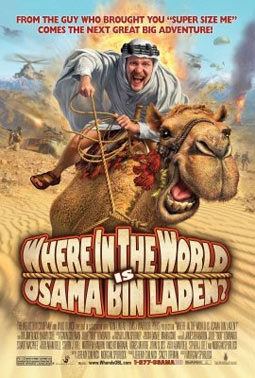
Morgan Spurlock: I thought Super Size Me resonated with people in a way that was very different than the way people related to other docs that I’d seen. I felt there was something about this whole experiential journey for me that I found to be really exciting and different. So from there we did 30 Days for FX and our third season just finished [shooting]. So, in between Super Size Me and Where in the World is Osama Bin Laden?, we did two seasons of that show. In season one Alex and I (Spurlock’s wife) lived on minimum wage. In season two I went to prison for 30 days. Just out of both of those experiences I said, “There’s something really exciting here.” It affected me on a personal level and on an emotional level. There’s something I really enjoy about taking you on a journey with me. So long as I can be honest with you, and honest with myself about how I’m feeling and how things are affecting me, I can relay all of this to you in real time. Then hopefully this vicarious journey you’re going on, it’s almost like you’re there. I learn something, you learn something. I feel something, you feel something.
PR.com: Do you feel that these experiences have made you a more compassionate person, and that you really didn’t understand what something was until you walked in those shoes?
Morgan Spurlock: I think you would have to have a heart made out of stone if you could go through these things and not become more compassionate and not have them affect you. You meet people and you go into situations or areas that you normally would never be in. It’s so out of your typical comfort zone. It really challenges you to look at the things you believe, and I think it challenges you to have to understand what other people are going through and what they’re facing. It’s not the same as when you read something in a book. It’s not the same as when you see it on the news and you can change the channel afterwards. You’re there and you’re there for however long you’re going to be there. You can’t turn it off.
PR.com: Both in Super Size Me, and then even more so in Where in the World is Osama Bin Laden?, you put yourself at risk. In Where in the World is Osama Bin Laden?, you went into territories where American troops get killed everyday. Were you ever afraid? Did you ever have the thought of, “Is this worth it?”
Morgan Spurlock: Once you’re there and you’re kind of embedded with guys, and you’re in situations where potentially everyday something could go horribly wrong and bad things can happen, you can’t help but think about that. For myself and Daniel [Marracino] (cinematographer for “Where in the World is Osama Bin Laden?”) it was one of those things we didn’t talk about. You just kind of did your job, plan for the worst and hope for the best. So that when things do go crazy and hit the fan, you’re at least somewhat slightly mentally prepared for things. We’re with the troops when we’re riding along in the convoy and the governor’s convoy was attacked by the Taliban. There was an ambush. So, you see us ride up and the Afghan national army and their troops take out that Taliban guy, [a guy] who basically slit his own brother’s throat to gain advancement in the Taliban. When you’re in the middle of a situation like that, you can’t help but have your heart in your throat.
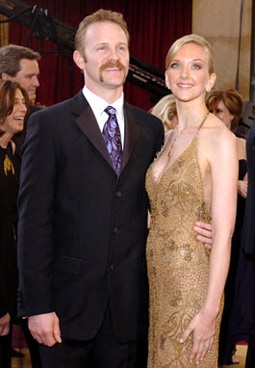
PR.com: What did your wife think? While she was pregnant you were not only thousands and thousands of miles away, but you were putting yourself at risk on a daily basis. What were her thoughts on that?
Morgan Spurlock: Alex is an incredibly patient wife (laughs), and a very understanding person. She’s really supportive of me. We were about two months into pre-production on Where in the World is Osama Bin Laden? when we found out she was pregnant. For me that’s when the film really took a big personal shift, because then it wasn’t just about, “Where is he? Why haven’t we caught him?” But, what kind of world am I about to bring a kid into? The more she and I talked about it, the more she encouraged me to make the film; I think to examine that issue that every parent wonders. You know, what kind of a world is this? She embraced this. And when I was overseas I didn’t tell her ninety percent of the stuff we were doing, or ninety percent of the things we were into, because I didn’t want to stress her out. She was already stressed enough with just me being gone, and knowing that I’m in Afghanistan; whatever broad stroke that means.
PR.com: What did you hope to get out of this, personally?
Morgan Spurlock: I think the biggest thing for me is, whenever you go into a new situation and a place that’s kind of the unknown, you hope you gain some sort of insight and understanding. I think I walked out of this with a much larger appreciation and understanding of the people who live in those areas; now seeing how they live and what they have to go through and what their hopes and fears are. It makes it real. These aren’t just faces on the news anymore. These aren’t just the people who I see screaming and yelling and burning flags and burning people in effigy. That’s not the majority of the people who live there. Over the last six, seven, eight years those are the faces that have dominated our vision of the Middle East, and I think it’s completely inaccurate.
PR.com: After speaking with civilians in Afghanistan, Egypt, Saudi Arabia, Palestinian territories and all of these different places, what percentage of what we see through American media would you say is propaganda driven, and what percentage actually holds water in your opinion?
Morgan Spurlock: I think that what you see is accurate. Those people exist. But, I think that we let them dominate the conversation. So, I think that what we end up seeing is just a very small minority of people that don’t represent the vast majority. As you see in the movie, 98% to 99% of the people over there don’t want to blow up America. They think about their families. They think about their own jobs. They want food on the table. They want to provide for their kids. They want their kids to get an education. And they want them to be healthy. This is a conversation that I could be having with my neighbor in Brooklyn. And God forbid we should ever see them that way. We just don’t get that imagery. Why? That’s an even larger conversation.
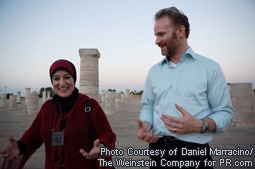
PR.com: What I found interesting in the film were some civilians who spoke to you in street interviews, who, when you asked, “Why do you think some of these young men are being lured into Al-Qaeda,” a lot of them said what I have thought for a very long time. They said that it’s a combination of extreme poverty and lack of education that enables these young men to be recruited.
Morgan Spurlock: Yeah, and then you add in there the component of people who are manipulating religious teachings for their own political gains. If you look at a lot of the hijackers from 9-11, these guys didn’t grow up in the ghetto. Some of them came from very wealthy families. At that point it’s about religious teachings and how it’s co-opted to really serve somebody’s twisted vision. I think that what the film does is, it paints a great broad picture of all of those pieces. It’s not just one thing. You can’t say, “This is the reason terrorism is a problem. This is the reason people come after us.” There are multiple reasons, from the ones you said to the supported regimes that oppress and torture their own people that are backed by the United States. Those all add up to a very troublesome stew.
PR.com: When you were in Saudi Arabia (Osama Bin Laden’s homeland) you said you wanted to see how Osama Bin Laden became who he became, by seeing where and how he was brought up. Did you gain any concrete insight into how he became who he is?
Morgan Spurlock: It’s a country where the religion drives everything. It is a country where there is no separation of church and state. It is a nation that is built on that marriage. When Saudi Arabia was formed the religious practitioners said, “Listen, we’re going to leave the government alone, and you leave us alone.” It was the deal that was struck between the Wahhabs and The House of Sauds. That’s continued on for years. There’s no control or crackdown on what is said within some of these mosques or schools. The teachings just go on however they see fit, and that’s the hard part.
PR.com: And when you were in Israel you encountered quite a bit of hostility.
Morgan Spurlock: Well, that was just in that one town, in Mea Shearim (an ultra- Orthodox community in Jerusalem). I think you can’t sum up Israel in that one scene.
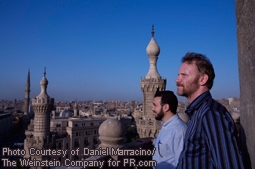
PR.com: It was strange to me. I’ve never personally been to Israel, but from people I know that have been there, they say that everyone is so warm and welcoming. And when you were met with such hostility in that one area, I couldn’t understand it. In the film, I didn’t get why that was happening. Was there something that provoked them?
Morgan Spurlock: I think that the Orthodox community is incredibly closed off and protective, for one. And our local producer who took us there said, “It’s fine. We’ll go and shoot there. I go there and talk to people all the time. Don’t worry about it.” And the reaction was shocking, yeah. [Our producer] wasn’t even prepared for this. When it got confrontational he called the police to come in and get us out. And also, they don’t like the media. They don’t like people coming in with cameras, which I found out after the fact. And here we are with a big HD high def. camera in the middle of their neighborhood. For me, the beautiful part of that scene isn’t the confrontation. That isn’t what comes out of it. The best part about that scene is the guy who is so concerned about how I’m perceiving the situation. And just as you said, everybody who goes there says the people are beautiful, they’re warm, they’re welcoming. The guy comes up to me and says, “Listen, what you see here, the majority of us don’t think like them.” There was a small group of people, five or six, that was causing this incredible raucous, that came up and was getting in my face and screaming and getting physical with me. And that guy says, “Most of us here, we don’t think like them.” There were hundreds of people around and he was so concerned about the perception of that event by me, that he had to make sure that I was very clear about what was happening. And his line is so fantastic, because it’s a parallel of perception with everything else that you see throughout the rest of the film.
PR.com: At one point you were in a metropolitan area of Israel when there was a bomb scare.
Morgan Spurlock: In Tel Aviv with the bomb squad. Those guys get 12 to 18 calls a day for bomb threats. Imagine that that’s how you live everyday. There are bomb threats and streets get shut down, and there could be a potential bomb everyday. That’s just part of life. That’s a tragic way to have to live.
PR.com: Did you happen to ask anyone on the street how they live with that, and how they just go about their normal routine without an enormous amount of anxiety?
Morgan Spurlock: Well they said, “We love living here. It’s terrible. We don’t like it, but it is what it is.” For me, I love the interview that we did with Yair Lapid (an Israeli journalist). He said so many great things about both sides. You hear people in the Palestinian territories, and you hear people in Israel. They want things to change. They want things to be peaceful. But, all it takes is one person; all it takes is one thing to ruin that.
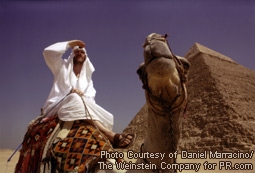
PR.com: After your experience in all of these countries and seeing the lack of freedom, the oppression, the poverty and the lack of education do you think that there is any merit whatsoever to George Bush’s concept of trying to spread democracy in the Middle East to end terrorism?
Morgan Spurlock: I think there’s something really inspiring about democracy. Letting people have a government is a great thing, and letting people have control and a voice in government is a great thing. But, what people overseas have a problem with is that here we are spreading democracy, and that’s what we’re saying, and then at the same time you have a country like Egypt that has a democracy where the President has been in power for twenty-six years. People there, if you speak out against the government you get arrested. If you try to speak out against the electoral process, there’s a guy we interviewed who was thrown in jail for three years and tortured…
PR.com: But is that democracy?
Morgan Spurlock: That’s the question. That’s what they say. “Is this democracy? Is this it?” So, what’s happened is the image of America overseas, and this is the biggest thing that our next President is going to have to deal with, is not just this “war on terror.” It’s a PR war on terror. Outside of America we’re not seen as a beacon of hope and democracy anymore. America isn’t put up on a pedestal like it once was. Now America is seen as an aggressor, as a country that wants to dominate others, as a country that wants to control the resources of other countries. Like a guy said in the film, [America] is a country that wants to eradicate the religion of Islam. That’s not the vision of America that I want or the vision of America that I have. Whoever gets elected, that should become priority number one, of shifting that.
PR.com: Do you think there can ever be a bridge extended, and the gap closed, between the Judeo-Christian population and the Muslim population in the world?
Morgan Spurlock: I’ve got Muslim friends. I know Muslim people. It’s not like it’s a gigantic gap. I think that we get fed this idea that, “Oh, we can’t understand them and it’s impossible.” This film shows that people are people. Those three religions - Judaism, Islam and Christianity - all stem from the same person. They’re the Abrahamic religions. It’s all a familial religion and, a lot of the things that they talk about are the same things. Even Muhammad, when he brought down the whole idea of Islam and started talking about what it was, he said, “It’s the same thing that’s been taught to these other people, only now the message is for this audience. It’s a message for the Arab people.”
PR.com: Do you think one man has a better chance of tracking down Osama Bin Laden then a government has?
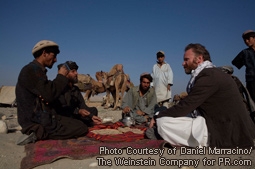
Morgan Spurlock: Well, I think any time you buy a lottery ticket, you don’t buy a lottery ticket thinking you’re gonna lose. You usually buy a lottery ticket saying, “Well it’s eighteen million to one; maybe I’ll be the one.” We knew that the odds were incredibly unlikely, but at the same time I think we had as good a shot as anybody. By the end, based on what people told us and where they were pointing and where they thought he was, we were probably within fifty to seventy miles of where people told us they thought he was.
PR.com: And where were you at the end of the film? Were you in the mountains of Pakistan?
Morgan Spurlock: We were outside of Peshawar (in Pakistan – a region that generally remains closed to foreign journalists) at the entrance to the border regions where you had to go into the tribal areas.
PR.com: And you said, “It’s not worth it.”
Morgan Spurlock: Yeah. I said a lot of things (laughs), but that’s pretty much the biggest thing for me was at that point it just really wasn’t worth it. Alex was about two weeks away from having our baby. Everybody and their brother over the course of this, before we got to the tribal areas, said “Why are you looking for this guy? He’s only one person? You’ve seen all of the other things that have kind of pushed people to follow him and his ideologies.” You know, it’s not worth it. If you could go right in and be able to knock on 342 Main Street, and he opens up the door and you go “Hey, how are you? Can I talk to you for a second?” that would be great, but it probably wouldn’t work out like that. Would it be great to find him? Of course it would. Should we find him and bring him to justice? Of course we should. But there’s multiple things that are still out there that would have to follow suit and would need to be addressed at the same time.
PR.com: After being nominated for an Oscar for Super Size Me have you noticed that there’s a difference in being able to raise funds and to get backing and distribution for your ideas?
Morgan Spurlock: Oh yeah. After that it became incredibly easier to raise money and to get my phone calls returned. Super Size Me did something that nobody even imagined was going to happen. It ended up playing in, like, seventy-five countries around the world. It resonated with audiences that went beyond a typical doc[umentary] demographic. That film made me realize that I want to try and make movies as broad as possible. I don’t want to make a film that preaches to one specific ideal or one specific agenda or one side of the aisle. I don’t want to make movies that are for a red state or a blue state, or conservative or liberal. I want to make films that are for everybody and deal with things that affect all of us.
PR.com: Are you more concerned with documenting a subject accurately and exploring that topic, or making what would be considered an artistically well made film? Which is your top priority?
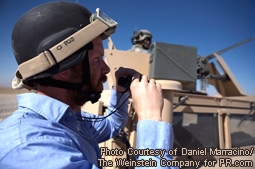
Morgan Spurlock: It’s all about the story. It should always come back to that. And it should come back to the people that are in that story and what it’s about. For me, when we begin a topic we have no idea where it’s gonna go. We’re gonna start at “A” and we’re gonna spin the top, and let’s see what happens. It becomes a very organic process. We either let things push us in different directions or pull us in different directions. You have ideas of people you want to talk to and where you want to go, but when you hit the ground running, that gets thrown out the window. Somebody doesn’t show up for an interview, you don’t know where this guy is, this person won’t talk to you, this guy will talk to you but you don’t really want to talk to him; you don’t know what’s gonna come out of it. Then out of that interview he opens up the door to, like, five other things that you never thought of… or five other people. It’s exciting, it’s gratifying. It makes shooting documentaries very difficult. With Where in the World is Osama Bin Laden? we shot nine hundred hours of footage that we then ended up editing down to the ninety minute film that we have. There was somebody that told me, before I made Super Size Me - I was just trying to get some advice and some feedback - and a friend of mine said that if the movie you end up with is the same movie that you envisioned when you started then you didn’t listen to anybody along the way. And that’s kind of a personal filmmaking mantra that I always keep in mind.
“Where in the World is Osama Bin Laden?” is playing in theatres now. Go to www.whereisobl.com.
The third season of the docu-series “30 Days” premieres on FX Networks on June 3rd. Go to www.fxnetworks.com/shows/originals/30days/.
